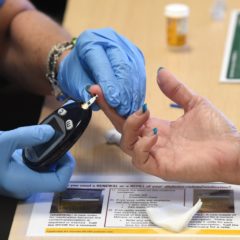Last Updated on March 5, 2024 by Alexander Sennuga
I would like to believe that knowing how to control diabetes would be a subject of interest to several people.
Please find below why it should be so, and I am sure you’ll thank yourself for gaining something worthwhile.

If you are keen on anyone having diabetes you ought to please read this page.
Please read my About Page on this blog to get informed about my personal encounter with diabetes. I have even defeated the disease forever!
With this breakthrough, along with some research, I was even ready to come up with these easy and definitive recommendations on the way to tame this disease.
This Is How To Control Diabetes
If and as long as the diabetic is determined and focused on these recommendations, defeating diabetes, especially type 2, is achievable.
It’s no exaggeration to mention that type 2 diabetes is curable through prevention.
How To Control Diabetes Type 2
Tip #1: When symptoms of diabetes are noticed.

Go for a diabetes test to check your blood glucose level. If the result is equal to or greater than 7.0 mmol/L, request a repeat test.
If there’s consistency, see your doctor immediately.
But, if the result is above 5.5 mmol/L but less than 6.5 mmol/L, try the subsequent.
- Adjust your diet to reduce sugary drinks and/or high-carbohydrate foods.
- Aim for moderate alcohol consumption as well.
These measures may drive your blood sugar down from 6.5 mmol/L.
Now go for another check-up to understand the newest results.
If you succeed, you ought to stick to those remedial practices and check once or twice a year as a routine.
Congratulations! You’ve put diabetes in check. Don’t slip into bad eating habits again.
Self-control and discipline may keep diabetes off you for the remainder of your life.
Tip #2: When confirmed to have diabetes

Yes, you’ve got diabetes, but there could also be light at the end of the dark tunnel anyway.
First, it is advisable to be faithful to yourself by using your medication as recommended.
But this is often not enough.
You would also like to pay good attention to your lifestyle and diet.
Regular checks using the glucose meter supplied to you by your diabetes nurse/doctor are vital.
As you change your lifestyle, you’ll notice a downward trend in your blood glucose level. If so, inform your doctor or nurse of the improved blood glucose results.
This is often done to reduce the medication.
They’ll not allow you to scale back the medication enough.
Sometimes the mixture of medication and lifestyle changes can cause you to have too low blood sugar (hypoglycemia).
You often need some common sense here. Attempt to reduce the medication on your own, guided by the results you get from your meter.
I repeat, your meter is your best guide!
If you win, inform your doctor by showing the later results you achieved to justify your actions.
You’ve got the will to control diabetes.
Again, the facility you’ve got is the ability to use the meter and its results!
How To Control Diabetes – Home Remedies
Tip #3: Give your Doctor a helping hand

The burden of gaining your health back is more on you than anyone else.
The doctor attends to several people – which may be a fact.
But the doctor can sometimes be wrong.
You’ve got with you, prepared to be used at will, a blood glucose meter. Therefore, please use this to your full advantage.
We all know well now that diabetes may be a lifestyle disease.
Awareness is growing that a lot of diabetics can overcome this disease just by changing their lifestyles.
Many do live the remainder of their lives free from diabetes. This is often possible if they do not slip back into their old, unhealthy lifestyles and diets.
Understanding how to reduce or abandon medication may be a helpful strategy any diabetic should learn. A diabetic advised to routinely inject, say, 20 units of insulin per day, should be somewhat flexible.
What if 15 units produce the specified result rather than 20 units?
If he or she is additionally making good efforts in diet and lifestyle changes, then a gradual reduction of medication is sensible.
So, this is often an inexpensive and helpful thing to try to do towards controlling diabetes.
How To Control Diabetes With Diet and Exercise
Tip #4: Embrace Low Glycemic Index Foods

One step in the direction of healthy eating is the inclusion of foods with a low glycemic index foods.
The glycemic index (GI), is a measure of how quickly a specific food can spike the blood sugar level within the body.
On a scale of 1–100, foods are classified into GI levels:
- Low GI: 55 or less (they raise blood sugar slowly)
- Medium GI: 56 – 70 (they raise blood sugar moderately)
- High GI: 70 or higher (they raise blood sugar quickly)
Tip #5: Control Your Portion
Diabetics are often advised to control the quantity of food they take in at a time.
Experts do advise that 60 to 75 grammes of carbs are the optimum load during dinner. Therefore, a diabetic consuming 90 grammes or more of carbs at dinner is already going over the bar.
A dietitian is required to provide professional advice when it comes to the number of carbs for every diabetic at meals.
Indeed, this is often strongly recommended.
Tip #6: Best Food Choices
Healthy eating is important for everyone. For diabetics, special choices are necessary to avoid spikes in their blood glucose.
Therefore, the recommended foods for a diabetic are the following:
Low content in:
- Sugar
- Carbohydrates
- Fat
- Salt
High content in:
- Whole grains
- Vegetables
- Fruits (low in the glycemic index)
Tip #7: Embrace Physical Exercise
Walking or light jogging for half-hour a day, five times every week, has proven to be sufficient to keep the body active.
Thus, this promotes optimising the heart rate, thus improving insulin sensitivity.
Find Out Your Risk Factors
Tip #8: Establish why you have diabetes in the first place

There are various reasons for the onset of diabetes in individuals.
It might be excessive consumption of sugary foods and/or drinks, high carbohydrate foods, or alcohol.
It might be the result of stress or sleep deprivation.
A pre-diabetic or diabetic should take time to study the danger factors mentioned above.
This is able to help determine which one or more are the enemies.
In my very own opinion and supported by personal experience, this is often the route to take.
Counting only on medical prescriptions without trying natural options might not be wise.
Takeaways
Diabetics should take seriously frequent monitoring of their blood glucose.
This is able to help us understand how to possibly do away with medical prescriptions.
Please note that an excessive combination of medication and lifestyle changes may result in low blood sugar (hypoglycemia).
When this happens, the intelligent reaction is a gradual reduction of medication. This demonstrates the right knowledge about how to control diabetes.
Then follow with a check to ascertain if lifestyle control is enough to come off medication. In addition, the diabetic should update the doctor with the later results showing a positive trend.
Never, ever believe the doctor’s ideas alone. Rather, put in your own “check-and-check” efforts and make suggestions to the doctor.
As supported by my personal experience, your meter results would assist you tremendously.
For instance, a diabetic in Singapore was recently reported to ignore his doctor’s medication.
He instead relied completely on diet control. We have the knowledge that he ultimately reversed his diabetes.
Conclusion
Using medication to keep diabetes in check should only be the last option.
There are effective natural alternatives, especially for type 2 diabetes.
Diet and lifestyle adjustments are popular and better options.
They have made it possible for mankind to achieve an entire reversal of type 2 diabetes.
Here, I have even described the 4 recommendations on how to control diabetes. These tips have helped me et al.
Since February 2015, I have not taken any medication. My blood glucose remains at a healthy level—a mean of 5.60 mmol/L.
FAQ
**Q: What is diabetes and how to control it?**
A: Diabetes is a chronic condition that affects how your body regulates blood sugar levels. To control diabetes, it is important to maintain a healthy lifestyle and follow a few key strategies. These include monitoring your blood sugar levels regularly, eating a balanced diet rich in fiber and low in refined sugars, engaging in regular physical activity, and taking prescribed medication as directed by your healthcare provider.
**Q: What are some dietary tips to help control diabetes?**
A: When it comes to managing diabetes, your diet plays a crucial role. Incorporating the right food choices can help control blood sugar levels effectively. Focus on consuming a variety of fruits, vegetables, whole grains, and lean proteins. Opt for low-glycemic index foods that have a minimal impact on blood sugar. Additionally, limit the intake of sugary beverages and processed foods. Don’t forget to control portion sizes and consider working with a registered dietitian for personalised meal planning.
**Q: Is exercise beneficial for diabetes control?**
A: Yes, exercise is highly beneficial for controlling diabetes. Regular physical activity helps improve insulin sensitivity and allows your cells to utilize blood sugar more effectively. Engaging in aerobic exercises like brisk walking, jogging, cycling, or swimming can help lower blood sugar levels. Strength training exercises, such as lifting weights, are also valuable as they improve muscle mass and aid in glucose metabolism. Aim for at least 150 minutes of moderate-intensity aerobic activity per week, along with two or more days of strength training.
**Q: How can weight management contribute to controlling diabetes?**
A: Maintaining a healthy weight is essential for managing diabetes. Excess weight, especially around the abdomen, can increase insulin resistance and lead to elevated blood sugar levels. By achieving and maintaining a healthy weight, you can improve insulin sensitivity and better control diabetes. Focus on a balanced diet, portion control, and regular physical activity, and consider consulting with a healthcare professional or registered dietitian for personalized guidance.
**Q: Are there any natural remedies that can help in controlling diabetes?**
A: While natural remedies may complement traditional diabetes management, it’s important to consult with your healthcare provider before incorporating any new treatments. Some natural remedies that may help in controlling diabetes include consuming foods with blood sugar-regulating properties, such as cinnamon, fenugreek, and bitter melon. Additionally, herbal supplements like ginseng and aloe vera may have potential benefits. However, remember that these remedies should not replace prescribed medication or lifestyle modifications. Always seek professional medical advice.
**Q: How does stress management impact diabetes control?**
A: Stress can have a significant impact on blood sugar levels and overall diabetes control. When you are stressed, your body releases hormones that can raise blood sugar levels. To manage stress effectively, consider practicing relaxation techniques such as deep breathing, meditation, or yoga. Engaging in hobbies, exercising, and maintaining a support system can also help reduce stress. By managing stress levels, you can improve your overall well-being and enhance diabetes control.
**Q: Can alcohol consumption affect diabetes control?**
A: Yes, alcohol consumption can affect diabetes control. Drinking alcohol in moderation is generally considered acceptable for people with diabetes. However, it’s crucial to be aware of the potential effects on blood sugar levels. Alcohol can cause hypoglycemia (low blood sugar) if consumed on an empty stomach or in large quantities. It’s important to monitor blood sugar levels, drink in moderation, and consume alcohol with food to help prevent fluctuations. If you have specific concerns or take medications that interact with alcohol, consult your healthcare provider for personalized advice.
**Q: How often should I check my blood sugar levels to control diabetes?**
A: The frequency of blood sugar monitoring may vary depending on the individual and the type of diabetes. In general, it is recommended to check blood sugar levels regularly to ensure proper diabetes control. Your healthcare provider will guide you on the specific monitoring schedule based on your condition. Typically, people with type 1 diabetes or those on insulin therapy may need to check their blood sugar multiple times a day, while those with type 2 diabetes may have a different monitoring routine. Adhering to your healthcare provider’s instructions is essential for effective diabetes management.
**Q: What role does medication play in controlling diabetes?**
A: Medication plays a crucial role in controlling diabetes, especially for individuals with type 1 diabetes or type 2 diabetes who require additional support beyond lifestyle modifications. There are various types of diabetes medications available, such as insulin, oral medications, and injectable medications. These medications help regulate blood sugar levels and improve insulin sensitivity. It’s important to follow your healthcare provider’s prescribed medication regimen, including dosage and timing, to effectively manage your diabetes.
**Q: How can regular medical check-ups contribute to diabetes control?**
A: Regular medical check-ups are vital for monitoring your diabetes and overall health. Through check-ups, your healthcare provider can assess your blood sugar levels, make necessary adjustments to your treatment plan, and identify any potential complications. They may also conduct tests to evaluate kidney function, cholesterol levels, blood pressure, and eye health. By attending regular check-ups, you can stay proactive in managing your diabetes and address any concerns or questions you may have.
Please note that these FAQs are meant to provide general information about controlling diabetes. It’s important to consult with a healthcare professional for personalized advice and guidance based on your specific condition and needs.
What other tips on how to control diabetes are helpful to you? Please share them in the comments section.
Very Important: PLEASE note that all information provided on this site is for educational purposes only. They are not meant for medical advice, diagnosis, or treatment.
So, please consult with your doctor and/or registered dietitian or nutritionist for any professional advice.
Get their okay before applying any of the information here on your health issues.

